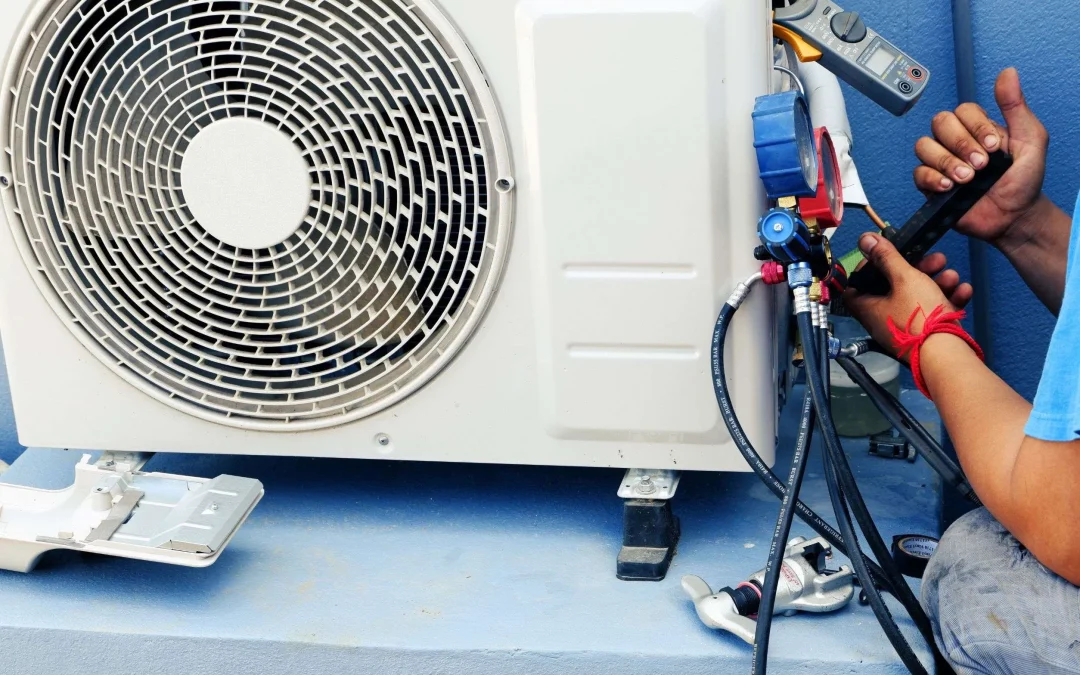The fact that a tiny component, like a capacitor, can have major consequences when it malfunctions surprises a lot of people. So what specifically happens in an air conditioner to cause a capacitor to fail? We’ll look at a few of the most prevalent causes in this article.
Overheating:
Air conditioning capacitors can overheat because, like many electrical parts, they are heat-sensitive. Your AC capacitor may overheat because it is located in the outdoor section of your air conditioner and is exposed to the sun’s rays all day.
In addition, if the air conditioner runs too hard for too long, the capacitor could overheat. For this reason, it’s critical to ensure that your air conditioner accommodates your room adequately and that you maintain it. By arranging routine maintenance visits and changing the filter every few months, you can relieve some of the strain on your capacitor during periods of high cooling.
Overload or Power Surge:
Although the odds of your house or air conditioner being struck by lightning are slim, it is nonetheless possible. The capacitor is destroyed when there is an abrupt surge of energy, such as that caused by a lightning strike, which overloads and fries the capacitor. Small power spikes or other power variations might overcharge the capacitor and lead to its failure.
If the fan motor burns out or becomes obstructed in any way, your air conditioner capacitor may also fail. In an attempt to power the fan, the capacitor keeps sending electricity, but eventually, it overloads and burns out. Furthermore, it could burn out if your capacitor is the wrong size or voltage for running your air conditioner properly.
Dirty Filters:
To keep indoor air clean, air filters are essential for capturing dust, pollen, and other airborne particles. On the other hand, neglectful blocked filters impede airflow. Due to the additional effort required to circulate the air, the air conditioner uses more energy and puts more strain on the system. The capacitor, a crucial part that powers the compressor and fan motor, may eventually overheat and fail as a result of this increased strain. Maintaining clean or replaced filters regularly guarantees efficient airflow and saves needless system wear.
Dirty Coils:
An air conditioner’s evaporator and condenser coils are crucial to heat exchange. These coils can gather dirt, dust, and debris over time, which insulates the coils and lessens their capacity to efficiently absorb or release heat. The system has to work harder and operate longer when the coils are dirty since it can’t chill the air as effectively. The system and the capacitor may overheat as a result of this increased workload, possibly breaking down. Maintaining effective heat exchange and avoiding overheating requires routine coil cleaning.
Refrigerant Leaks:
Refrigerant leaks prevent the system from cooling down effectively, which prolongs run times and puts more stress on the compressor. The capacitor may overheat as a result of this extreme strain and eventually fail. Refrigerant leaks must be found and fixed quickly to preserve system performance and stop more damage.
Improper Sizing:
The size of your capacitors must be appropriate for your air conditioner. A capacitor may not be able to handle the electrical load effectively in your particular system if it is too tiny or huge, which could result in an early failure. A capacitor that is too small may find it difficult to supply the energy required to turn on the compressor and fan motors, which could lead to overwork and eventual burnout. On the other hand, an overly large capacitor may provide excessive power, which may potentially result in harm. To prevent this problem, make sure the capacitor is appropriately suited to the specifications of your system.
FAQs:
1. Can I Change An Air Conditioner’s Capacitor On My Own?
If you have the required equipment and some basic electrical understanding, you can change a capacitor on your own. But the most important thing is safety. Before turning on the air conditioner, always switch off the power, and make sure the replacement capacitor fits the original’s specs.
2. How Do I Pick The Appropriate Replacement Capacitor?
It is necessary to match the original capacitor’s voltage rating and capacitance, which are expressed in microfarads, or µF when replacing one. Using a capacitor with a different rating may cause the air conditioning system to operate improperly and may sustain damage.
3. What Occurs If The Microfarad Rating Of The Capacitor I Use Is Incorrect?
If the capacitor does not have the correct microfarad rating, the motor may overheat, run inefficiently, or possibly fail. An overrated capacitor will overstress the motor, while a capacitor with an inadequate rating won’t deliver the voltage extra power that it needs.
4. How Do I Safely Discharge A Capacitor Before Handling It?
Make sure the power is out before you safely discharge a capacitor. Next, tap the capacitor’s terminals with an insulated screwdriver that has a rubber grip. Any electrical energy that has been stored will be released by this procedure, making it safe to handle.
5. How Can I Determine Whether A Capacitor Is Operating Correctly?
A multimeter configured to measure capacitance can be used to test a capacitor. After the capacitor is discharged and disconnected from the circuit, attach the multimeter leads to the capacitor terminals. To determine if the measurement is within the allowable range, compare it to the capacitor’s rated capacitance.


